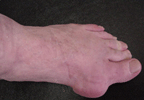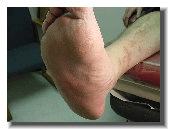Tom's wife: Thanks for your post!
Your last paragraph really hit home. It would be nice if medical care providers and mental health therapists would actually look at the whole unit. I've said that before so many times. From what I've seen, my husband has a general practice doctor, one for his neuropathy, one for his arthritis, one for his vision. He has seen a dietitian. He has a really good pharmacist who double checks drugs all the time. He does not have an endocrinologist. A couple of these are referrals outside his HMO. As far as either of us can tell....none of them ever communicate with each other.
It seems that the mental health therapists have all simply explained the disease, given it a lot of fluff terms, told him the signs of depression to be on the lookout for. Left that up to him to self-diagnose!
No one has ever once asked him about his personal life or his functionality at work.
When he has a low, they want to change his meds to get his levels as even as they can. There is rarely ever a follow-up visit.
He had ONE nurse who actually took the time to chart his highs and lows and make recommendations to his doctor to change his insulin.
They all only seem to take care of the 1 or 2 things that their "speciality" calls for. They tell him that his GP is the one who oversees all this, but the GP only does a general physical when he visits him and will ask, "how is your diabetes, any changes?" and he will say "no" and that's the extent of their conversation.
I often wonder if it's because they have never experienced living with someone who has diabetes....that they don't fully comprehend what goes on in a "low". Doctors are no longer allowed to tell a patient that they are going to die if they don't follow a medical treatment plan. Did you know that? They can only provide you with positive, optimistic outcomes. So at best, his doc can tell him to cut back on fatty foods and sweets. But the other problem is that if the doctor were to ask my husband if he eats many sweets, my husband would tell him "no".
So you have the sad situation where a patient is willing to lie to the doctor in order to avoid the consequences.
They have told him that he is not a candidate for a pump.
The "new" dietetic lingo is "a carb is a carb" and my hubby has taken that to mean he can eat all the sweets that he wants. But if you google carbs, you can soon learn that there are different types of carbs that react differently in the body. I sure wish his dietitian would tell him that!
And I've been told by his HMO that they flat out do not provide any services for caregiver support. They gave me a video and 2 books that were pretty much related to a young person taking care of an elderly person....how to keep them clean, move them so they don't get bedsores....nothing related to highs and lows that diabetics go through, the rages, the anger....nothing at all
And finally, I'd like to get someone to tell me how to handle the situation of no memory when in a low. The nurse that provides me the best counseling has said that she doesn't have an answer for that one short of video taping him. But when we talked about that a little more, she agreed that bringing out a video camera when he was in a low would only provoke him to greater anger. She agreed that there is a very fine line to walk here and literally said, "I don't know how you do it." So, at least rather than denying it happens, she understood that it does.
And therein probably lies the whole problem. Diabetics who don't remember what they did during a low and spouses who won't/don't/can't confront them....and if we do, we are simply told that it didn't happen....because they don't remember it!
When the medical community wakes up and starts addressing the "whole" then we might find help. Until then, I do believe this dickering about words, terms, phrases, titles.....is just a way to get around addressing the real problems that are out there!
DW
Tuesday, January 12, 2010
Subscribe to:
Post Comments (Atom)



2 comments:
I think the key point is that your husband doesn't (won't?) see an endocrinologist. The endo is the one who will ask the more probing questions about how your husband's diabetes is, what his blood sugar ranges are, and what his diet is. Without one, none of these doctors will know the specifics about what to ask about diabetes.
An endo could also put him on a trial of a continuous glucose sensor so that it would be clear to everyone exactly what your husband's blood sugars are doing. The trial is usually a blinded system, so your husband would not see the readings as they were happening.
And no, your husband is not a pump candidate because he won't take the responsibility to test his blood sugars several times a day. Without ongoing blood sugar testing, using a pump doesn't make any sense.
The tools and medical professionals are out there--your husband needs to be a willing participant in his care, which you have stated over and over again he is not.
Lyrehca, I totally agree! I really want him to see an endo, think he needs it. He tells me that his MD won't make the referral. I suggested he "demand" it. He said, "no, he's not going to do that". I can sort of understand that - why piss off your MD?
I really know the tools are out there. I know he could improve. He's simply made a choice not too. I just keep praying that he will decide to change.
Post a Comment